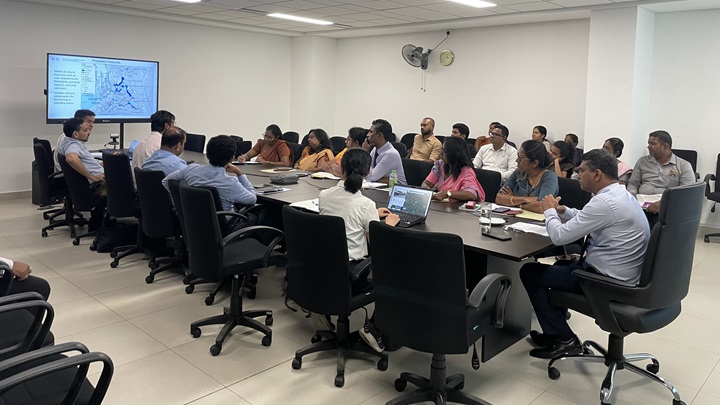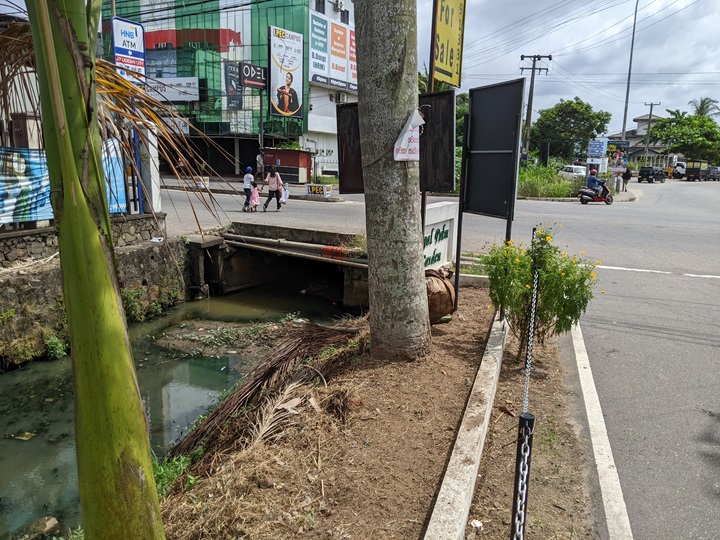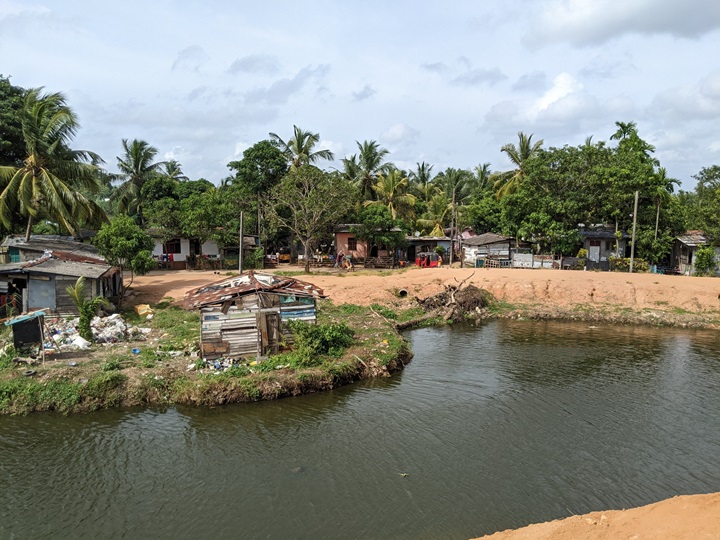Urban Flood Risk Analysis Under Climate Change: Discussions With Stakeholders in Sri Lanka Led by Executive Senior Research Fellow Sato Ichiro
2025.09.18
From June 30 to July 5, 2025, Executive Senior Research Fellow Sato Ichiro and Visiting Fellow Narita Daiju (Professor, Graduate School of the University of Tokyo) of the JICA Ogata Sadako Research Institute for Peace and Development (JICA Ogata Research Institute) visited Sri Lanka as part of the Institute’s research project “Quantitative Evaluation of Climate Change Adaptation Benefits of Urban Flood Management .”

Executive Senior Research Fellow Sato Ichiro and other research team members discuss the results of the study with local government officials from the study area
The impacts of climate change is becoming increasingly evident year after year. Many developing countries, facing this growing risk, are making strong demands for development cooperation that supports climate change adaptation. However, it remains difficult to quantitatively evaluate adaptation measures, due to uncertainties in climate projections across regions and periods, and fluctuations in socioeconomic factors.
This research project aims to address that challenge by applying the Robust Decision Making (RDM) framework, a decision-support methodology designed for situations under deep uncertainty, to develop new approaches to assessing the effectiveness of climate change adaptation measures. Specifically, the project focuses on river basins in Sri Lanka’s Colombo Metropolitan Region, where future flood risks are expected to increase due to climate change, urbanization-driven population growth, and land-use changes. The research team looked at how flood mitigation measures proposed in the Storm Water Drainage Plan (Master Plan) in 2023, developed through JICA’s technical cooperation, could serve as effective adaptation measures.
During this visit, the research team shared the results of the first-round analysis (conducted in 2024) with local stakeholders, including the project counterpart Sri Lanka Land Development Corporation, and exchanged views on improvements to the analytical framework for the second round of analysis.
Presenting a variety of simulation results, Sato highlighted outcome performance metrics such as inundation water level, economic losses, number of affected houses, inundation duration, and benefit-cost ratios. Summarizing the findings, he explained that: (1) climate change is highly likely to make urban flooding both more frequent and more severe in the future; (2) the structural measures (e.g., river improvements, floodgates and pumping stations) proposed in the Master Plan can significantly reduce flood risks under most future scenarios, but vulnerabilities remain under some harsh scenarios (e.g., significant increases in maximum 24-hour rainfall due to climate change, and rising sea-level combined with high water levels in the Kelani River; (3) wetland development scenarios will have a major impact on future flood risks; and (4) semi-permanent and temporary houses are especially vulnerable to flooding because of their location and structural characteristics.

A narrow canal linking the Kalu Oya and Mudun Ela basins, whose surrounding areas are frequently flooded

Houses of low-income residents built in flood-prone areas along the river
These results attracted strong interest from the Sri Lanka Land Development Corporation, which expressed an intention to share the findings with policymakers. In response, the research team plans to compile the results in the Institute’s Policy Notes series and other publications. In this way, the JICA Ogata Research Institute seeks not only to disseminate research outcomes but also to feed timely insights and recommendations—generated during the research process—to policymakers and development practitioners.
The project also benefited from the valuable inputs provided by a collaborating team from the International Water Management Institute, King’s College London, and a nonprofit organization, AmbioTEK, whose research is supported under the research-to-action program, Reversing Environmental Degradation in Africa and Asia (REDAA) funded by the Foreign, Commonwealth and Development Office (FCDO) of the United Kingdom. Looking ahead, the work by the research team from the JICA Ogata Research Institute will reflect stakeholder feedback in the second-round analysis, aiming to evaluate the effectiveness and values of urban flood mitigation and wetland management options, taking into account the potential future impacts of climate change and socioeconomic shifts in the Colombo Metropolitan Area.

事業事前評価表(地球規模課題対応国際科学技術協力(SATREPS)).国際協力機構 地球環境部 . 防災第一チーム. 1.案件名.国 名: フィリピン共和国.

事業事前評価表(地球規模課題対応国際科学技術協力(SATREPS)).国際協力機構 地球環境部 . 防災第一チーム. 1.案件名.国 名: フィリピン共和国.

事業事前評価表(地球規模課題対応国際科学技術協力(SATREPS)).国際協力機構 地球環境部 . 防災第一チーム. 1.案件名.国 名: フィリピン共和国.

事業事前評価表(地球規模課題対応国際科学技術協力(SATREPS)).国際協力機構 地球環境部 . 防災第一チーム. 1.案件名.国 名: フィリピン共和国.

事業事前評価表(地球規模課題対応国際科学技術協力(SATREPS)).国際協力機構 地球環境部 . 防災第一チーム. 1.案件名.国 名: フィリピン共和国.
scroll